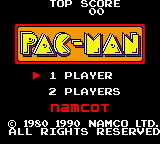Difference between revisions of "Pac-Man"
From Sega Retro
Scarred Sun (talk | contribs) |
|||
| Line 41: | Line 41: | ||
| segapower_source={{num|25|page=42}} | | segapower_source={{num|25|page=42}} | ||
| segapro=79 | | segapro=79 | ||
| − | | segapro_source={{num|1|page=64}} | + | | segapro_source={{num|1|page=64|pdf=Segapro UK 01.pdf|pdfpage=64}} |
}} | }} | ||
{{Scanbox | {{Scanbox | ||
Revision as of 09:47, 19 January 2015
| Pac-Man | |||||
|---|---|---|---|---|---|
| System(s): Sega Game Gear | |||||
| Publisher: Namco | |||||
| Developer: Namco | |||||
| Peripherals supported: Gear-to-Gear Cable | |||||
| Genre: Action | |||||
| Number of players: 1-2 (alternating) | |||||
| |||||
Pac-Man (パックマン) is a 1980 arcade game developed by Namco. It became incredibly successful to the point that it saw ports to consoles of the time and continues to see ports — made in-house, officially licensed, and homebrew — to today's systems. The only port of the game to a Sega system, however, was an in-house port to the Sega Game Gear in late 1990 (consequently, it was released early 1991).
The Game Gear version of the game is relatively faithful, though due to the smaller resolution, graphics are smaller in size and the full maze cannot be shown without scrolling. This problem can be addressed by selecting 1/2 screen size where the graphics are drawn smaller but the full maze is displayed at once.
On an interesting note, Sega's 1982 arcade game Ali Baba and 40 Thieves runs on modified Pac-Man hardware.
Gameplay
The basic goal of Pac-Man is to eat all the dots (or pellets) in a maze, avoiding ghosts. By eating a power pellet, Pac-Man is able to eat the ghosts as well for a short period, and the ghosts will then respawn from the center of the screen. Levels are completed once all the dots are eaten, and extra points can be achieved by eating fruit.
Physical Scans
| Sega Retro Average | |||||||||||||||||||||||||||||||||||||||||||||||||||||||||||||||||||||||||||||||||||||||||
|---|---|---|---|---|---|---|---|---|---|---|---|---|---|---|---|---|---|---|---|---|---|---|---|---|---|---|---|---|---|---|---|---|---|---|---|---|---|---|---|---|---|---|---|---|---|---|---|---|---|---|---|---|---|---|---|---|---|---|---|---|---|---|---|---|---|---|---|---|---|---|---|---|---|---|---|---|---|---|---|---|---|---|---|---|---|---|---|---|---|
|
| 69 | |
|---|---|
| Based on 17 reviews | |
| Game Gear, US (Majesco) |
|---|
| Game Gear, JP (Namcot cart) |
|---|
|
| Pac-Man games for Sega systems | |
|---|---|
| Pac-Man (1991) | Ms. Pac-Man (1993) | Pac-Attack (1994) | Pac-In-Time (unreleased) | |
| Ms. Pac-Man (1991) | Pac-Mania (1991) | Pac-Man (????) | |
| Ms. Pac-Man (1991) | Pac-Mania (1991) | Pac-Attack (1993) | Pac-Man 2: The New Adventures (1994) | Pac-Man (2018) | Pac-Man Pocket Player (2018) | Pac-In-Time (unreleased) | |
| Ms. Pac-Man Maze Madness (2000) | |
- ↑ File:Segapro UK 01.pdf, page 64
- ↑ ACE, "February 1992" (UK; 1992-01-08), page 94
- ↑ Beep! MegaDrive, "February 1991" (JP; 1991-01-08), page 85
- ↑ Console XS, "June/July 1992" (UK; 1992-04-23), page 148
- ↑ Computer & Video Games, "December 1991 (Go! Issue 2)" (UK; 1991-11-15), page 7
- ↑ GamePro, "December 1991" (US; 1991-xx-xx), page 126
- ↑ Hippon Super, "February 1991" (JP; 1991-01-07), page 43
- ↑ Joystick, "Avril 1991" (FR; 1991-0x-xx), page 130
- ↑ MegaTech, "Xmas 1991" (UK; 1991-12-06), page 38
- ↑ Mean Machines Sega, "October 1992" (UK; 1992-09-xx), page 143
- ↑ Play Time, "(8/9)/92" (DE; 1992-07-08), page 97
- ↑ Power Unlimited, "Nummer 3, Oktober 1993" (NL; 1993-09-29), page 55
- ↑ Sega Power, "December 1991" (UK; 1991-10-30), page 42
- ↑ Sega Pro, "November 1991" (UK; 1991-xx-xx), page 64
- ↑ Sega Pro, "March 1992" (UK; 1992-02-20), page 20
- ↑ Sega Pro, "April 1993" (UK; 1993-03-11), page 74
- ↑ Sega Saturn Magazine, "September 1995" (JP; 1995-08-08), page 88
- ↑ VideoGames & Computer Entertainment, "November 1991" (US; 1991-1x-xx), page 88







